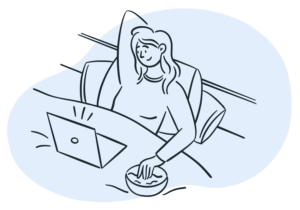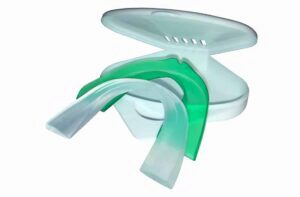Nation of Nappers
Disclosure: By clicking on the product links in this article, Mattress Nerd may receive a commission fee at no cost to you, the reader. Read full disclosure statement.

The sleep world can be a surprisingly controversial space with many on-going debates about the ideal way to sleep. To use a top sheet or not use a top sheet? To sleep with the fan on or leave it off?
Napping is another one of those areas that sparks a serious conversation. Is napping a good means to restore your energy, or is it harmful to your sleep schedule? Is it appropriate to take a nap every once in a while for a quick refresh, or is it lazy and indicative of a poor character?
We wanted to get to the bottom of this once and for all to find out what nappers are really like. We surveyed 2,000 Americans to examine the personality differences between nappers and non-nappers. Keep reading for an in-depth look at our results.
Personality Traits of Nappers
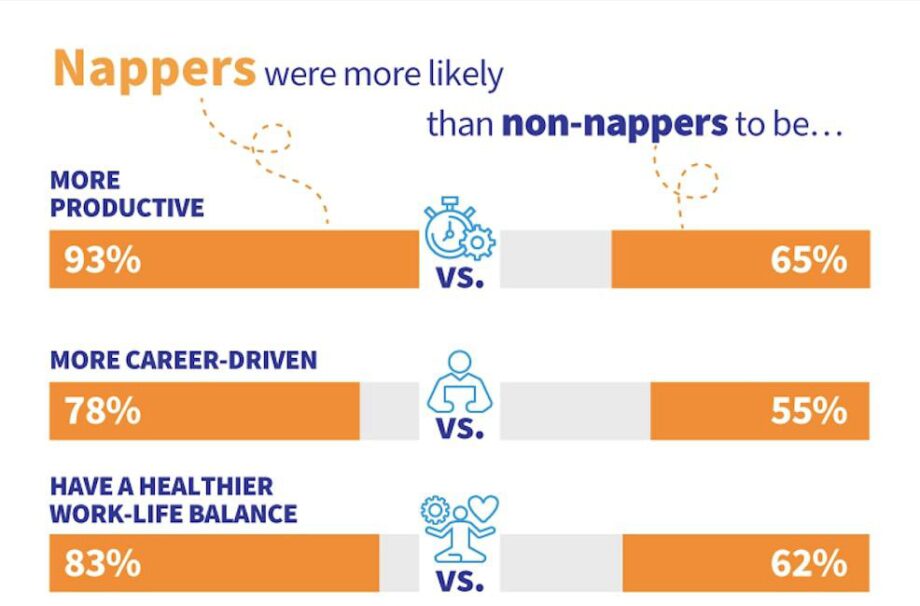
Contrary to the opinion that napping makes you a lazy person, our survey results revealed that self-identified nappers share many positive attributes. In fact, the results indicate that napping may be the key to becoming a more productive person, as nappers were more likely than non-nappers to identify as a productive person by a large percentage (93% vs. 65%).
When it comes to their careers, nappers certainly don’t slack off. Over three-quarters of self-identified nappers described themselves as a career-driven person, but only 55% of non-nappers said the same.
And napping may be the key to a better life overall too; self-identified nappers were more likely to report having a healthy work-life balance (83% vs. 62%) and identify as a happy (90% vs. 79%) and confident person (89% vs. 79%).
The Benefits of a Nap
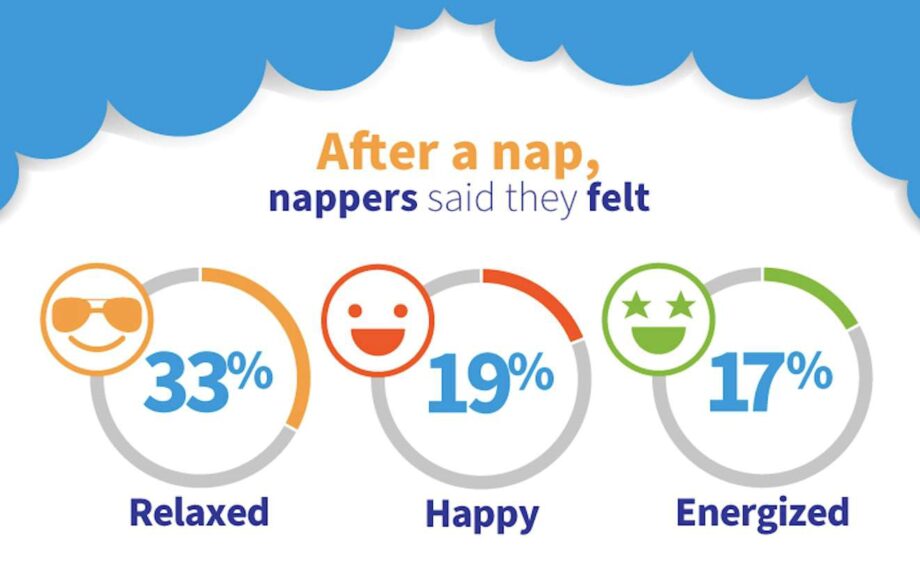
Some people say a nap is exactly what they need to feel refreshed and ready to go on with their days. Others argue that a nap makes them more groggy and ready to go back to bed.
Our survey showed that overall naps are making more people feel good than groggy. The top reported post-nap feelings were relaxed, happy, and energized!
Nappers experiencing these positive emotions likely keep their naps around 15 minutes during the day. Otherwise, those feelings of happiness, energy, and relaxation could quickly turn into sleep inertia, causing confusion, grogginess, and disorientation, according to this study.
TOP 5 POST-NAP FEELINGS
- Relaxed (33%)
- Happy (19%)
- Energized (17%)
- Confused (15%)
- Groggy (12%)
Dedicated Nappers
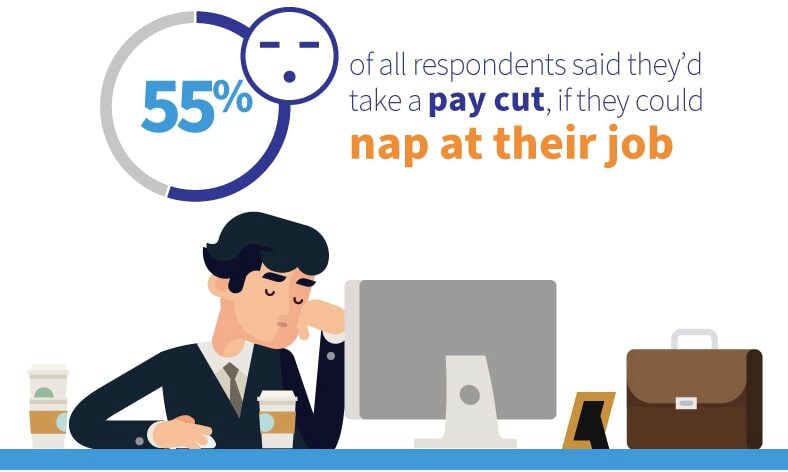
Those on the pro side of the napping debate are serious about their siestas. Our results found that 79% of nappers are so dedicated to their naps that they consider it a hobby of theirs.
A nap can be extremely hard to come by, especially when you’re stuck working a 9 to 5. In fact, 55% of all respondents said they’d be willing to take a pay cut if they could nap at their job!
So we wondered, just how much will Americans do for a nap? It turns out, these nap enthusiasts are willing to give up a whole lot for the ability to take a nap whenever and wherever they want with ease.
TOP 10 THINGS AMERICANS WOULD DO FOR A NAP
- Go back in time and relive high school (33%)
- Live with your parents for the rest of your life (32%)
- Live in a studio apartment with your childhood bully for one year (30%)
- Give up Netflix for life (29%)
- Give up using Uber for five years (28%)
- Never have access to wifi ever again (27%)
- Give up sex for a year (25%)
- Live alone in the woods with no electricity for three months (24%)
- Give up all electronic devices for one month (24%)
- Only travel by foot anywhere you go for one year (22%)
All the challenges surrounding taking a successful nap may be solved with a few small adjustments, though. The survey found the prime-time to take a nap is 1:31 p.m. and the ideal room temperature is 65 degrees.
The Verdict: To Nap or Not to Nap?
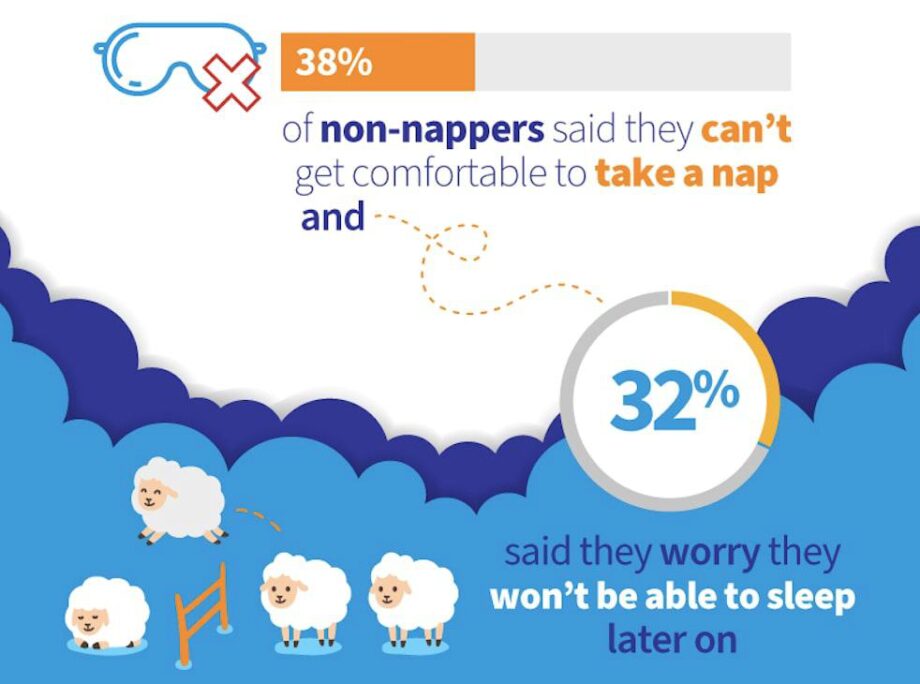
We’ve spent a lot of time talking about the nap enthusiasts of our survey, so it’s time to touch on the anti-nappers. The top reported reasons people avoid taking naps are difficulty getting comfortable enough to take a nap (38%) and concerns about being about to sleep later on (32%).
The comfort concerns could easily be soothed — we are mattress experts after all, so if you need help finding the best mattress to keep you comfortable we’ve got you covered — but the worries about getting great sleep at night after a daytime nap are completely valid, and may even save you some trouble down the line.
Napping for too long during the day can make it difficult to sleep at night. And if you have trouble sleeping at night, you’re more likely to take a longer nap during the day. It’s a viscous cycle that’s difficult to escape and may even shorten your lifespan by causing health complications.
Keeping your naps to a short 20-30 minutes is ideal. According to an April 2016 study, napping longer than 60 minutes during the day increased the risk of Type 2 Diabetes by 50% and increased the risk of cardiovascular disease by as much as 89%.
Ultimately, your sleep schedule is entirely up to you. We’re beyond the days of only thinking of sleep as what we do in our beds for eight hour chunks of time each night. Now we have office nap pods, polyphasic sleep, and further advancements to come.
While it’s ideal for most people to maintain a consistent schedule of seven to nine hours of quality sleep each night, that’s not always the case. With emerging research on the effects and benefits of napping, we can all take a look at the science behind sleep schedules more closely to find habits that work for our lifestyles.
Methodology
Mattress Nerd partnered with OnePoll to conduct a survey of 2,000 Americans on their napping preferences and personality traits.
Fair-Use Statement
You are welcome to share our results with your audience. We simply ask that you provide a link back to this page to properly credit us.

